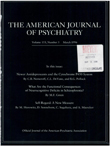Expressed emotion, perceived criticism, and relapse in depression: a replication in an Egyptian community
Abstract
OBJECTIVE: The aims of this study were to determine the value of families' expressed emotion and patients' perception of family criticism in predicting relapse in Egyptian depressed patients and to evaluate transcultural differences in assessment of these measures. METHOD: The subjects were 32 consecutive depressed patients from psychiatric clinics in Cairo and Ismailia, Egypt, who fulfilled the DSM- III-R criteria for major depression or bipolar disorder. An Arabic version of the Camberwell Family Interview was administered to key relatives of the depressed patients. Rating of expressed emotion was performed blindly by a qualified rater to assess levels of criticism, hostility, emotional overinvolvement, warmth, and positive remarks. Patient perception of family criticism (perceived criticism) was also assessed. All patients were followed up for 9 months to assess relapse and compliance with treatment. RESULTS: The relation of family criticism to relapse was statistically significant. Although this result replicates previous findings, the criticism level that best differentiated relapsers and nonrelapsers was a score of 7, which is much higher than previously reported in Western studies. This relation was not observed for other expressed emotion components. Also, no association between perceived criticism and relapse was detected. CONCLUSIONS: Expressed emotion is a prognostic factor that should be assessed with consideration of the specific culture and intrafamilial patterns. The use of perceived criticism in the prediction of relapse in depression is questionable. There is a need for a simplified, less time-consuming assessment tool that takes cross-cultural differences and specificities into consideration.
Access content
To read the fulltext, please use one of the options below to sign in or purchase access.- Personal login
- Institutional Login
- Sign in via OpenAthens
- Register for access
-
Please login/register if you wish to pair your device and check access availability.
Not a subscriber?
PsychiatryOnline subscription options offer access to the DSM-5 library, books, journals, CME, and patient resources. This all-in-one virtual library provides psychiatrists and mental health professionals with key resources for diagnosis, treatment, research, and professional development.
Need more help? PsychiatryOnline Customer Service may be reached by emailing [email protected] or by calling 800-368-5777 (in the U.S.) or 703-907-7322 (outside the U.S.).



